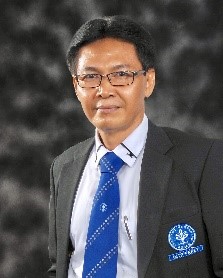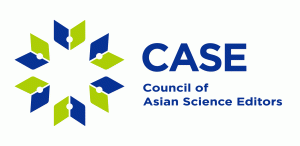Qs to the chairman of the IASJE

[Introduction]
[Q]: Would you briefly explain your organization for the readers of CASE?
[A]: Indonesian Association of Scientific Journal Editors (IASJE) was established on 26 January 2018. IASJE is a non-government, non-partisan, and non-profit organization which was established to accomodate and help to solve the problems encountered by journal editors in journal managements. The vision of IASJE is to be an organization that contributes to the development of science, technology, and arts in Indonesia. Meanwhile, the mission of IASJE is to improve the quality and visibility of Indonesian journals and to promote the journals into the international level. The executive board of IASJE consists of President, Secretary General, Two Vice President, Treasurer, and four Chairs of Committees (Education and Training; Publication Ethics; Publication and Information; and Collaboration). The president of IASJE is elected by the members for two years periode during the IASJE Congress. The president can be re-elected for another second term. During the congress, besides the election of new president, there are also some agendas discussed such as ratification of Statute, and Bylaws (if required), and programs planning for the next two years. IASJE main activities are to improve national journals in order to meet the national standard for accreditation, and to promote the accredited journals to be recognized international journals through workshops and exchange information using WhatApps aplication.
[Questions]
[Q]: It has been notified that the IASJE is making a huge progressing in a very short time. Can you briefly introduce what projects you have been working on recently for the progress of the ISAJE?
[A]: Indonesia has so many scientific journals, it is nearly 33,000 journals. It is not possible for the government to handle all of those journals to make them becoming good quality journals, therefore, organization like IASJE is really required to support the government programs in improving the journal quality by improving the editor capacity in managing the journal. In this case, IASJE is closely collaborated with Ministry of Research and Technology, Indonesia that has the responsibility for journal development in Indonesia. So that most of IASJE programs are collaborated and funded by the ministry of research and technology, but some activites are also conducted independently by IASJE with the funding from the members and non-members of IASJE who participated on the activities. Some activities that IASJE working on recently were the serial workshops for internationalization of national journals i.e., workshop on Scopus indexation strategy, Web of Science indexation strategy, and How to apply for DOAJ (Directory of Open Access Journal) and CrossRef.
[Q]: As a chairman, please tell us how you are planning to lead the IASJE during your term.
[A]: IASJE was established just 2 years ago. There are still many things to do in term of internal management and external services and collaboration. For the internal management, the executive board members regularly have meetings to discuss the plan and development of IASJE. It is much easier during this Covid-19 pandemic because we can do it online. For the external services, especially services for IASJE members, we established a WhatApps group in the mobile phone for intensive communication, so each member can ask question in the group regarding the journal editorial concerns and other members can answer the question based on their knowledge and experinece. This is in line with the purpose of the IASJE establishment is to share information amongst the IASJE members. Currently, the number of IASJE members is nearly 400 editors who come from universities, research centers, and Indonesian Institute of Sciences all over Indonesia.
[Q]: Among many of thoughts and plans for the IASJE, what is your most focus and what would you like to achieve the goal?
[A]: Most of Indonesian Journals are still on low performance, so IASJE in collaboration with the ministry of research and technology try to improve the journal performance through two main programs:
- national accreditation program: All national journals should apply for accreditation. This is the basic standard for national journal performance which consists of management and content evaluation. Journals which passed the accreditation will be graded from Sinta 1 (Score >85) to Sinta 6 (Score >30). This program is very successful, and currently there are 5148 journals that have been nationally accredited.
- internationalization program: Journals that have Sinta 1 and Sinta 2 grades are selected and supervised to meet the Scopus and Web of Science selection criteria. The selection was mostly based on the diversity of editors, reviewers, and authors as well as the language used for website and fulltext articles. This program is also very succesful, in the year 2020 alone, there were addition of more than 30 journals included in the Scopus database. Currently, there are 83 Indonesian journals included in the Scopus database. In the year 2020, ministry of research and technology provided incentive to 45 Sinta 1 and 2 grade journals for internationalization program, especially to apply for Scopus indexing in the year 2021.
[Q]: In the long run, what courses do you pursue for the IASJE?
[A]: In the long run, IASJE will still focus on the 2 programs mentioned above. In addition, we need to slowly and consistently educate the journal editors on the publication ethics based on COPE (Committee on Publication Ethics) standard, because many editors are still unaware the important of the publication ethics for the international standard journals. Besides that, IASJE also wants to make a certification program for journal editors in Indonesia, so the journal editors will have the basic competency standard in journal management.
[Q]: Finally, do you have any words for the readers of CASE?
[A]: Currently, CASE members have only 3 national editor organizations i.e., Korean Council of Science Editors (KCSE), Vietnam Association of Science Editors (VASE), and Indonesian Association of Scientific Journal Editors (IASJE). I hope, in the near future, other Asian countries will also establish similar association as to accelerate the improvement of Asian Scientific Journals to be well recognized as international journals and Asian researchers will be proud to publish their reserach works in Asian Journals. Besides that, such associations are very usefull in improving the coordination between CASE central office and its members as to improve CASE existency and the benefit of CASE for its members.
Brief Biography;
Komang Wiryawan was graduated from Bogor Agricultural University in 1985, and obtained his PhD degree from the University of Adelaide, Australia in 1995. He currently works as a professor at the Department of Animal Nutrition and Feed Technology, Bogor Agricultural University (1987-now). He is the President of the IASJE from 2018-2020 and 2020-2022, Vice President of CASE (2020-2022), and the Chief Editor of Tropical Animal Science journal (indexed in Scopus since 2016 and currently on Q2 at the Scimago database) from 2012 until now. In addition, He becomes editorial board members of some national and international journals. He is also a member of the national assesors for journal accreditation as well as national research reviewer under the Ministry of Research and Technology, Indonesia.
Thank you very much for your time.
